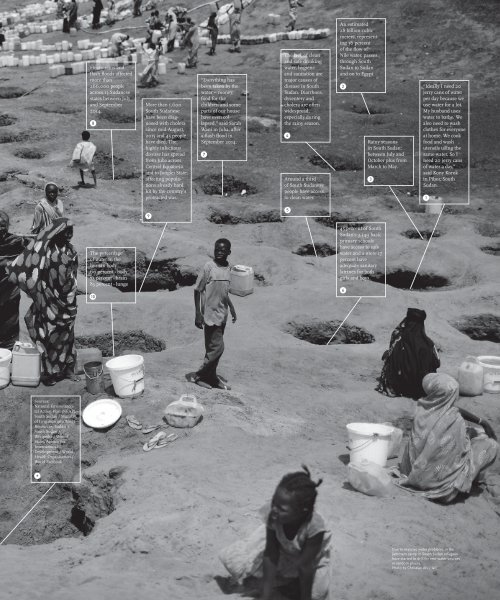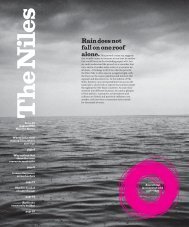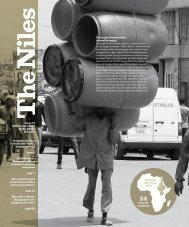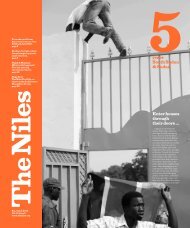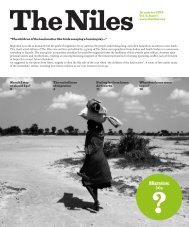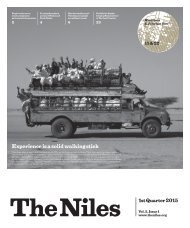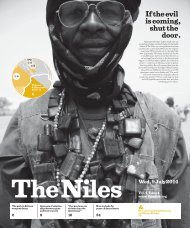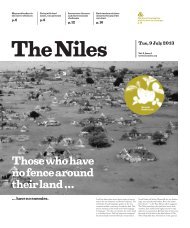A fool will not even find water in the Nile!
The Sudanese proverb raises the question: Does the fool drown in his search for water or is he saved by it? And who is, in fact, this fool? Given the wasteful and unfair dealings of mankind with this dwindling resource – aren’t we all? While doing research on water, The Niles correspondents in South Sudan and Sudan met fishermen who deal carefully with the water that nourishes them and business people who exploit the resource without restraint. They report on conflicts around water but also on exemplary projects where water is shared peacefully. In short, the fool is still swimming, but for how long?
The Sudanese proverb raises the question: Does the fool drown in his search for water or is he saved by it? And who is, in fact, this fool? Given the wasteful and unfair dealings of mankind with this dwindling resource – aren’t we all? While doing research on water, The Niles correspondents in South Sudan and Sudan met fishermen who deal carefully with the water that nourishes them and business people who exploit the resource without restraint. They report on conflicts around water but also on exemplary projects where water is shared peacefully. In short, the fool is still swimming, but for how long?
You also want an ePaper? Increase the reach of your titles
YUMPU automatically turns print PDFs into web optimized ePapers that Google loves.
Heavy ra<strong>in</strong>s and<br />
flash floods affected<br />
more than<br />
266,000 people<br />
across 13 Sudanese<br />
states between July<br />
and September<br />
2014.<br />
8<br />
More than 1,600<br />
South Sudanese<br />
have been diagnosed<br />
with cholera<br />
s<strong>in</strong>ce mid -August,<br />
2015 and 45 people<br />
have died. The<br />
highly <strong>in</strong>fectious<br />
disease has spread<br />
from Juba across<br />
Central Equatoria<br />
and to Jonglei State,<br />
affect<strong>in</strong>g populations<br />
already hard<br />
hit by <strong>the</strong> country’s<br />
protracted war.<br />
“Everyth<strong>in</strong>g has<br />
been taken by <strong>the</strong><br />
<strong>water</strong> – money,<br />
food for <strong>the</strong><br />
children and some<br />
parts of our house<br />
have <strong>even</strong> collapsed,”<br />
said Sarah<br />
Wani <strong>in</strong> Juba, after<br />
a flash flood <strong>in</strong><br />
September 2014.<br />
7<br />
The lack of clean<br />
and safe dr<strong>in</strong>k<strong>in</strong>g<br />
<strong>water</strong>, hygiene<br />
and sanitation are<br />
major causes of<br />
disease <strong>in</strong> South<br />
Sudan. Diarrhoea,<br />
dysentery and<br />
cholera are often<br />
widespread,<br />
especially dur<strong>in</strong>g<br />
<strong>the</strong> ra<strong>in</strong>y season.<br />
4<br />
Around a third<br />
of South Sudanese<br />
people have access<br />
to clean <strong>water</strong>.<br />
An estimated<br />
28 billion cubic<br />
meters, represent<strong>in</strong>g<br />
30 percent<br />
of <strong>the</strong> flow of<br />
<strong>Nile</strong> <strong>water</strong>, passes<br />
through South<br />
Sudan to Sudan<br />
and on to Egypt.<br />
2<br />
Ra<strong>in</strong>y seasons<br />
<strong>in</strong> South Sudan:<br />
between July and<br />
October plus from<br />
March to May.<br />
3<br />
“Ideally I need 20<br />
jerry cans of <strong>water</strong><br />
per day because we<br />
use <strong>water</strong> for a lot.<br />
My husband uses<br />
<strong>water</strong> to ba<strong>the</strong>. We<br />
also need to wash<br />
clo<strong>the</strong>s for everyone<br />
at home. We cook<br />
food and wash<br />
utensils us<strong>in</strong>g <strong>the</strong><br />
same <strong>water</strong>. So I<br />
need 20 jerry cans<br />
of <strong>water</strong> a day,”<br />
said Kony Korok<br />
<strong>in</strong> Pibor, South<br />
Sudan.<br />
1<br />
1<br />
9<br />
5<br />
The percentage<br />
of <strong>water</strong> <strong>in</strong> <strong>the</strong><br />
human body<br />
60 percent - body<br />
73 percent - bra<strong>in</strong><br />
83 percent - lungs<br />
10<br />
45 percent of South<br />
Sudan’s 3,349 basic<br />
primary schools<br />
have access to safe<br />
<strong>water</strong> and a mere 17<br />
percent have<br />
adequate sanitary<br />
latr<strong>in</strong>es for both<br />
girls and boys.<br />
6<br />
Sources:<br />
National Environmental<br />
Action Plan (NEAP),<br />
South Sudan / M<strong>in</strong>istry<br />
of Irrigation and Water<br />
Resources, Sudan +<br />
South Sudan /<br />
Wikipedia / United<br />
States Agency for<br />
International<br />
Development / World<br />
Health Organisation /<br />
World Factbook<br />
*<br />
Due to massive <strong>water</strong> problems <strong>in</strong> <strong>the</strong><br />
Jammam camp <strong>in</strong> South Sudan refugees<br />
have started to drill for new <strong>water</strong> sources<br />
<strong>in</strong> random places.<br />
Photo by Christian Als / laif<br />
<strong>the</strong>niles6_20151123.<strong>in</strong>dd 3<br />
2015/11/23 2:13 PM


